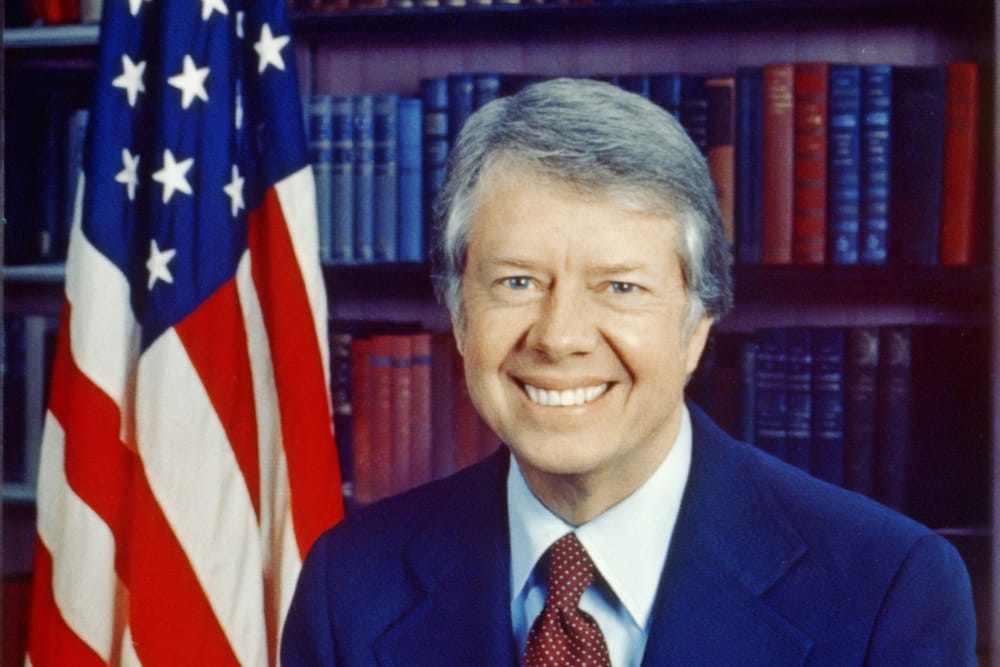The passing of President Jimmy Carter on December 29, 2024, marks the end of an era but not the end of his profound impact. Carter, who lived to the remarkable age of 100, was more than just a politician — he was a living embodiment of faith, humility, and a relentless dedication to the service of others. As we reflect on his extraordinary life, it becomes clear that Carter exemplified the values many of us who follow Christ strive to live by: faith in action, service with love, and a commitment to justice.
Born on October 1, 1924, in Plains, Georgia, Jimmy Carter grew up in the segregated South. His experiences shaped his deep sense of community and fairness, which became hallmarks of his career. After graduating from the U.S. Naval Academy in 1946 and serving as a naval officer, Carter returned home to take over his family’s peanut farming business.
In 1962, he began his political career, serving in the Georgia State Senate before becoming the state’s governor in 1971. His rise to the presidency in 1976 came at a time when America desperately needed moral leadership. Emerging from the shadow of Watergate, Carter brought integrity and a faith-centered vision to the White House.
As the 39th president of the United States, Carter prioritized diplomacy, human rights, and environmental conservation. His administration achieved historic milestones, including the Camp David Accords, which secured peace between Egypt and Israel, and the establishment of the Departments of Energy and Education.
Yet his presidency was not without challenges. The Iran hostage crisis and economic struggles overshadowed his term, providing fodder for his political adversaries. What truly set Carter apart, however, was his unwavering commitment to doing what was right, even when it was politically unpopular.
Carter’s presidency was cut short not because of failure, but because of a calculated political maneuver known as the Southern Strategy. This effort by the Republican Party sought to reclaim the South as a conservative stronghold by intertwining race, religion, and politics. Carter — a deeply religious Democrat — represented a vision of faith rooted in justice and equality. But the political forces of the time distorted religion into a tool for division, ushering in the rise of white Christian nationalism.
In choosing to turn their backs on Carter’s moral leadership, these forces embraced a darker path. Carter’s legacy stands as a stark contrast to the cynicism and divisiveness that came to define much of American politics in the years that followed.
If Carter’s presidency was marked by moral conviction, his post-presidential years were defined by unparalleled humanitarian impact. In 1982, he founded The Carter Center, an organization dedicated to promoting human rights, advancing democracy, and alleviating human suffering. His efforts in eradicating diseases like Guinea worm and promoting peace around the globe earned him the Nobel Peace Prize in 2002.
Carter’s hands-on involvement with Habitat for Humanity, even into his 90s, was a powerful testament to his belief in service over status. He did not merely preach the Gospel; he lived it, showing the world what it means to love one’s neighbor as oneself.
For those of us who walk our lives in faith and service, Carter remains a beacon of hope and a model to emulate. He exemplified what it means to follow Christ — not through loud proclamations, but through quiet, consistent acts of love and justice.
If there is any outward appearance we should strive for, it is Carter’s. He projected humility, integrity, and a deep compassion that transcended politics and resonated with people from all walks of life. He showed that faith is not a private belief, but a public witness — a light that shines in our actions and choices.
Jimmy Carter’s passing is a moment of profound loss, but also one of reflection and gratitude. He showed us that greatness is not measured by power or wealth, but by the lives we touch and the love we give.
As I say goodbye to this extraordinary man, I am reminded of the teachings of Christ and the path Carter so faithfully walked. If there is a heaven — and I believe there is — I am certain Carter was welcomed with open arms, his life’s work met with pride and joy by the God he served so diligently.
This post originally appeared on Medium and is edited and republished with author's permission. Read more of Jay Morman's work on Medium.
